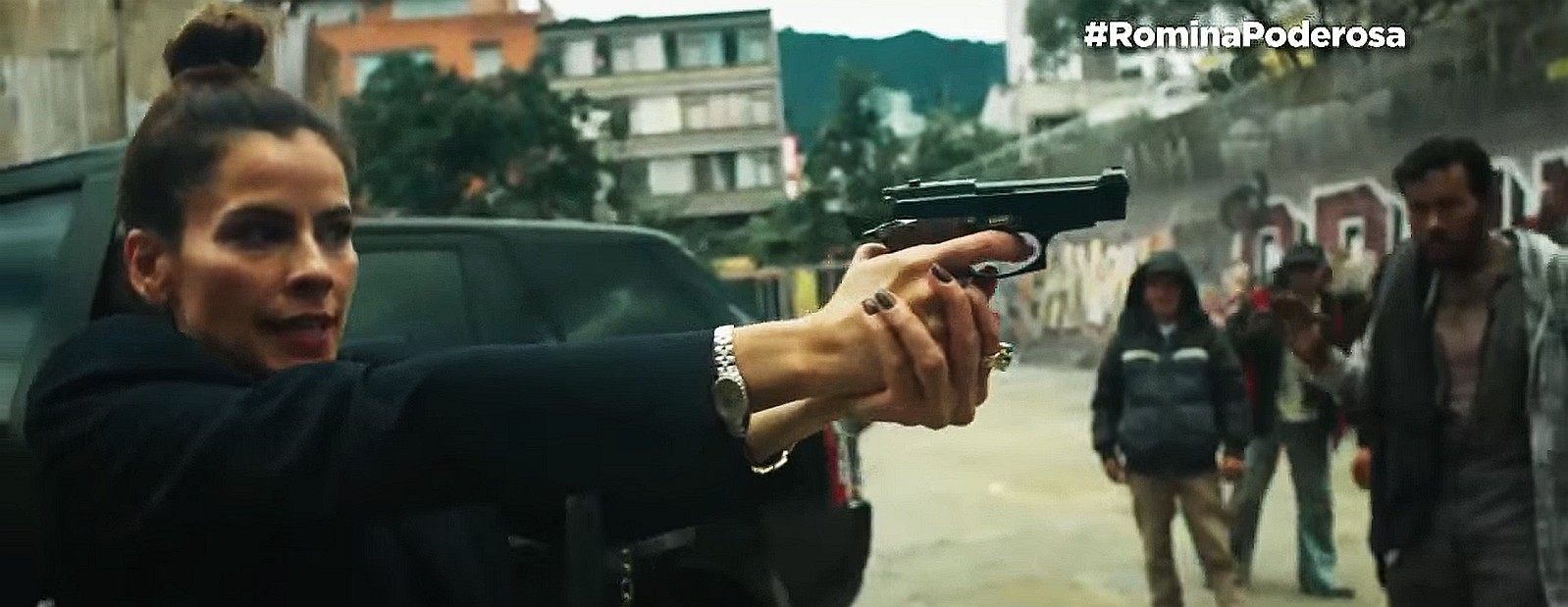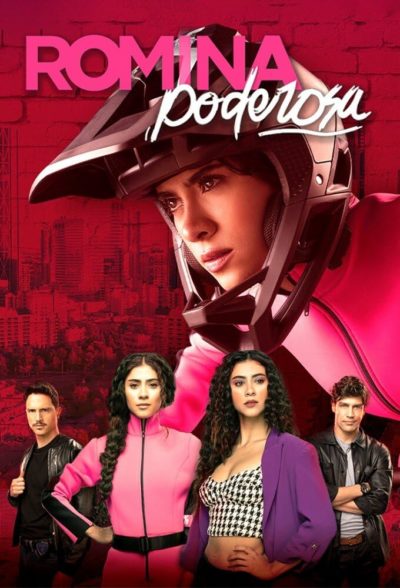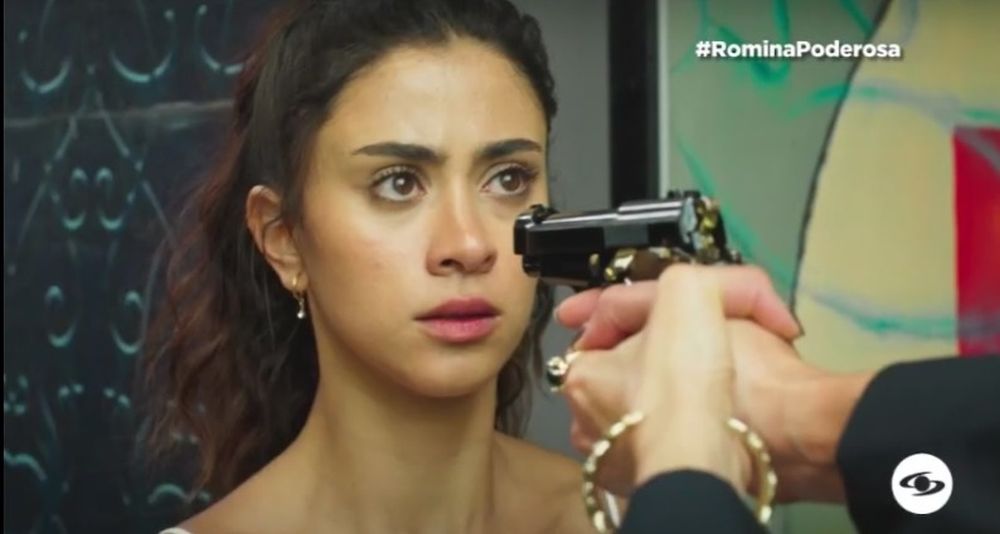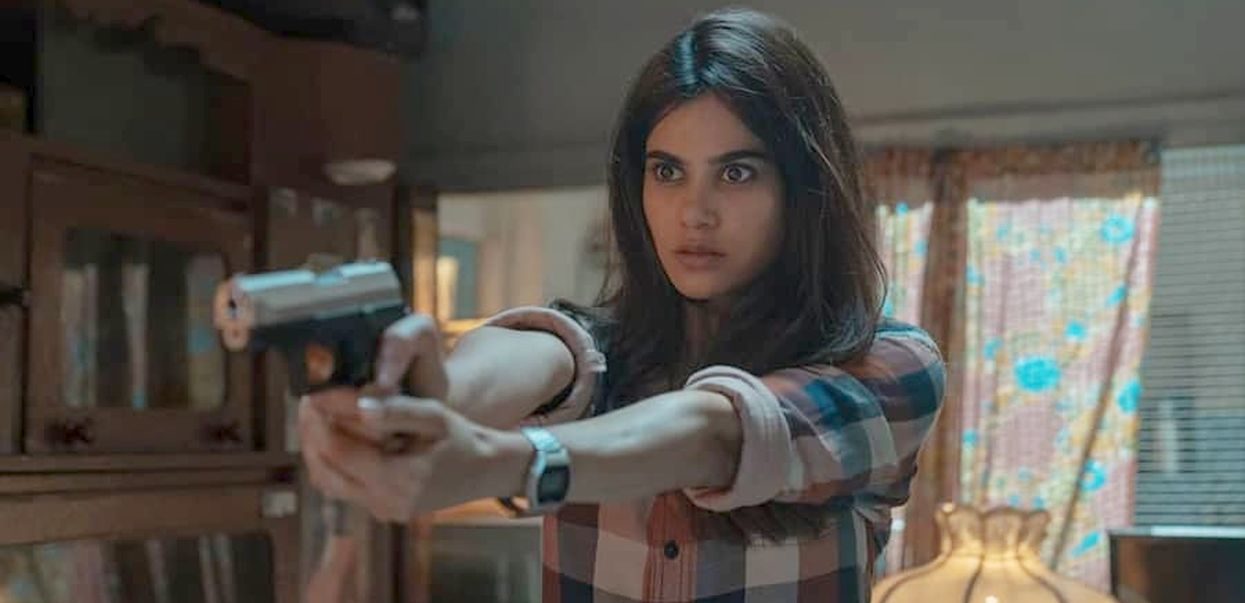 ★★★
★★★
“Life going in cycles.”
The concept of twins, separated at birth, is one which has been used frequently in films and television. Sometimes for comedic effect, such as Arnold Schwarzenegger and Danny DeVito in Twins, or the two Jackie Chans in Twin Dragons. But also for dramatic impact: the most famous example is probably that of Luke and Leia in the Star Wars franchise, who were parted in order to hide them from their father. In our genre, Orphan Black works along similar lines. But this Colombian telenovela goes full-bore into it, across almost the entire duration of its sixty-seven episodes, with the concept a young woman adopting her twin’s identity being at the core of the show.
It begins with Romina Paez (Molina), who is a BMX champion in the Mirla, a poor neighbourhood. After winning a race, she uses the interview to rail against the loan sharks who prey on the locals, offering much-needed money at extortionate rates, and extracting repayment with brutal violence. This interview has two results. Firstly, the Chitiva brothers who run the loan sharkage, are unimpressed, and decide Romina should pay. Secondly, it brings Romina to the attention of rich girl Laura Vélez (also Molina), who sees Romina is her spitting image. She goes to investigate, and finds that they actually have a common mother. Mom used to work for Laura’s dad, got pregnant and had them both. Dad took Laura to his family as “an adoptee”, while Romina remained with her natural mother.
 These two elements clash, when the Chitiva brothers order the assassination of Romina and her mother. Except, it’s actually Laura is killed, while visiting her mother in the barrio. Romina escapes, and decides the best option is to pretend to be dead, and indeed, pretend to be Laura. However, Romina/Laura is intent on bringing those responsible for “her” death to justice, and it’s not long before reports of Romina’s ghost haunting her old stomping grounds are passing around. Investigating from the position of law is honest cop Cristobal “Whiz” Ruíz, who eventually comes to know Romina’s secret. But in another twist, the crime lord at the top of the tree, above the Chitivas… is Laura’s mother, Virgina Vélez (León).
These two elements clash, when the Chitiva brothers order the assassination of Romina and her mother. Except, it’s actually Laura is killed, while visiting her mother in the barrio. Romina escapes, and decides the best option is to pretend to be dead, and indeed, pretend to be Laura. However, Romina/Laura is intent on bringing those responsible for “her” death to justice, and it’s not long before reports of Romina’s ghost haunting her old stomping grounds are passing around. Investigating from the position of law is honest cop Cristobal “Whiz” Ruíz, who eventually comes to know Romina’s secret. But in another twist, the crime lord at the top of the tree, above the Chitivas… is Laura’s mother, Virgina Vélez (León).
Yeah, it’s a fairly ridiculous concept, and what unfolds over the rest of the show often teeters on the brink of implausibility. While I get the “twins” thing, the idea that after twenty entirely separate years of upbringing, in utterly different circumstances, they would still perfectly resemble each other physically, to the extent that even their own parents can’t tell them apart, strains credulity. Romina basically blames everything from the sudden loss of memory to her changes in personality on a head injury, and after a quick visit to the doctor, who naturally pronounces her right as rain, that’s the end of the matter. She still has to manage her double life, and the ever-expanding circle of people who know about it, on both sides of the class divide.
Inevitably, there’s a whole lot of soap-opera nonsense going on here, across the uniformly photogenic cast. Laura’s boyfriend falls for Romina, Whiz falls for Romina, Whiz’s colleague falls for him, and it all gets incredibly messy emotionally. This is probably the least interesting part of the show, though it does occasionally work. The final episode, for example, has Whiz pouring out heart in wedding karaoke, but it’s done with such obvious and heartfelt sincerity, that it powers past the obvious schmaltzy aspects, and I was genuinely happy for the man. On the other side, Leo Chitiva (Bury) is the most interesting of the low-level villains. He’s another one who loved Romina, but his criminal life is incompatible with that, leaving him with difficult, yet interesting, choices.
I say “low-level,” because I think my favourite character is likely Virginia, especially as the show proceeds and she needs to become increasingly ruthless (as shown, top) as she struggles to escape the net closing around her. I would love to have seen a prequal series, explaining in more details exactly how she went from humble origins, both to running a major criminal organization, and also marrying her, apparently utterly oblivious husband. I get that some spouses are oblivious to their other halves being a serial killer, and also there’s Virginia’s “charitable foundation” which probably operates as a front. Still, I suspect I’d have at least something of a clue, if Chris was running the Cuban mafia out of the office here.
There is a bit of weirdness here: the Colombian version of the show runs for 67 episodes, but there are only 65 on Netflix. It’s possible there may also be differences in the ordering, but I haven’t been able to confirm that. I’m not sure why two episodes would not be available on Netflix. While other streaming services have removed episodes for content (such as the blackface episodes on It’s Always Sunny in Philadelphia, I can’t think of anything here which would be so contentious. My instinct might be music rights: the show uses a lot of popular Colombian songs and artists, and getting clearance globally could have proved too problematic. I can’t say I noticed at the time, though it isn’t really the kind of show that demands 100% of your attention.
I would like to have seen Romina make more use of her BMX skills. This is significantly stressed earlier, but definitely fades out of the picture as we get deeper into things. But between Virginia and some of the other women characters, such as Whiz’s partner Alex Bedoya (Camila Rojas), who is occasionally a bit of a bad-ass, it does end up qualifying for the site. It ends more or less as you would expect, but if my somewhat shaky Spanish is to be believed, there is a second series on the way. Though with the Spanish language title perhaps being Romina Embarazada, which translates as “Pregnant Romina,” I’m not certain I’ll be writing about it here!
Dir: Rafael Martínez Moreno
Star: Juanita Molina, David Palacio, Zharick León, Kevin Bury
a.k.a. Romina Poderosa

 There are times when I end up asking myself deep philosophical questions, like “Why am I doing this?” or “Isn’t there something else on which I can use my time?” In this case it, was “Who thought a sequel to the painful exercise which was Ebony Hustle was necessary?” To be fair though, this is an improvement. A half-star might be pushing it, to the point I did wonder about introducing a ★¾ rating. Or possibly a ★ and 11/16. It’s not good, to be clear. But it’s definitely less aggressively incompetent, with some of the most annoying rough edges smoothed down. For example, the audio this time mostly (although not entirely) lives around the same level, and there’s only one Facetime scene.
There are times when I end up asking myself deep philosophical questions, like “Why am I doing this?” or “Isn’t there something else on which I can use my time?” In this case it, was “Who thought a sequel to the painful exercise which was Ebony Hustle was necessary?” To be fair though, this is an improvement. A half-star might be pushing it, to the point I did wonder about introducing a ★¾ rating. Or possibly a ★ and 11/16. It’s not good, to be clear. But it’s definitely less aggressively incompetent, with some of the most annoying rough edges smoothed down. For example, the audio this time mostly (although not entirely) lives around the same level, and there’s only one Facetime scene.




 ★★★½
★★★½ ★★★
★★★ These two elements clash, when the Chitiva brothers order the assassination of Romina and her mother. Except, it’s actually Laura is killed, while visiting her mother in the barrio. Romina escapes, and decides the best option is to pretend to be dead, and indeed, pretend to be Laura. However, Romina/Laura is intent on bringing those responsible for “her” death to justice, and it’s not long before reports of Romina’s ghost haunting her old stomping grounds are passing around. Investigating from the position of law is honest cop Cristobal “Whiz” Ruíz, who eventually comes to know Romina’s secret. But in another twist, the crime lord at the top of the tree, above the Chitivas… is Laura’s mother, Virgina Vélez (León).
These two elements clash, when the Chitiva brothers order the assassination of Romina and her mother. Except, it’s actually Laura is killed, while visiting her mother in the barrio. Romina escapes, and decides the best option is to pretend to be dead, and indeed, pretend to be Laura. However, Romina/Laura is intent on bringing those responsible for “her” death to justice, and it’s not long before reports of Romina’s ghost haunting her old stomping grounds are passing around. Investigating from the position of law is honest cop Cristobal “Whiz” Ruíz, who eventually comes to know Romina’s secret. But in another twist, the crime lord at the top of the tree, above the Chitivas… is Laura’s mother, Virgina Vélez (León).